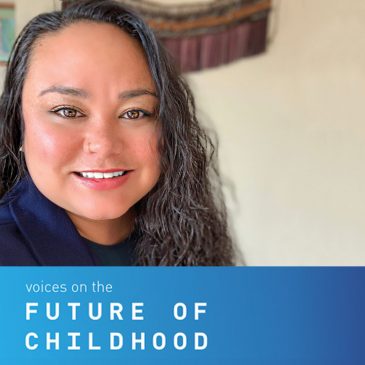In this series of blog posts, we asked our experts to share their perspectives on issues of race and racism and highlight the work they are doing in their respective fields. “What is your vision for the future of childhood? What are you doing in your professional capacity to achieve that vision, and/or who needs to do what to achieve that vision?”
The future of childhood will be built by the youth
 Jordan Taitingfong, MEd, is an educator and current doctoral student at the University of Washington whose research centers on the intersection of disability and race in early childhood.
Jordan Taitingfong, MEd, is an educator and current doctoral student at the University of Washington whose research centers on the intersection of disability and race in early childhood.
I often imagine the future of childhood as one where all children feel belonging in their bones. Recently, this has been hard. Protesting while Black people are murdered by police, fighting through COVID-19 for basic needs, and resisting the deepening of inequities in distance learning. I worry my visions fall short, then I am reminded: the children are imagining.
As adults discuss police abolition, so do children. “We should give police new jobs,” said a four-year-old recently. My preschoolers’ voices are reflected in the work of mutual aid groups, “Teacher Jordan, she can have some of mine. I’ve got a lot.” Children have radical ideas for the future. Our job is to create spaces that center their voices while giving them tools to understand the world so they can create something better.
For over 10 years, I taught children with and without disabilities in an inclusive classroom, and now I provide professional development for early educators on inclusive practices for building their own communities of belonging. Through my work, I center children’s voices. I recognize the power, wisdom, and understanding children bring when we create spaces where we respect them. Giving them words like ableism, racism, and xenophobia allows them to engage. Recognizing play as an expression of voice allows us to see their understandings as they shape the world.
In the same way that disability justice must center people with disabilities, and racial justice movements must center Black, Indigenous, and other People of Color, a vision for the future of childhood is incomplete without our youngest pushing it forward. A future of childhood built on belonging can exist. If we support them, our children will forge it in ways only they can imagine.
See more posts in this series:
Voices on the Future of Childhood
Christy Crawford | Jordan Taitingfong | Mariana Díaz-Wionczek | Martez E. Mott
Pablo Miralles | Rahsaan Harris | Stanley Pierre-Louis | Vicki Ariyasu

